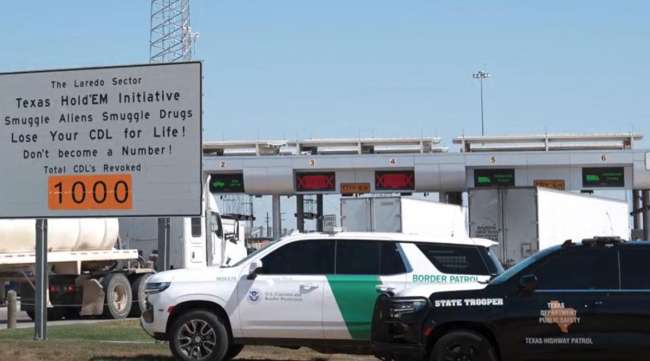A sign promotes the Texas Hold’Em Initiative, which began in 2008. (U.S. Border Patrol Laredo Sector via Facebook)
A partnership between U.S. Customs and Border Protection and the state of Texas has resulted in more than 1,000 truckers having their commercial driver licenses permanently revoked for smuggling people and drugs across the U.S. border with Mexico.
The joint initiative between the Texas Department of Public Safety and CBP is called the Texas Hold’Em Initiative. Under the program — which began in 2008 — when the holder of a CDL from any state is convicted in federal court of smuggling humans or drugs into the U.S., that person is disqualified for life from holding a CDL in any state.
RELATED: USDOT Warns States on Nonresident CDL Compliance
“It does not matter what state the CDL was issued, if they are caught and convicted of smuggling in the state of Texas, they lose their CDL for life,” said Tomas Carrillo Jr., acting special operations CBP supervisor of the agency’s Laredo sector. The federal nature of the crimes brings CBP into the fold, but it is Texas that notifies all other U.S. states when a person is convicted. So far this fiscal year, 141 CDLs have been canceled under the program.

Carrillo
The Texas program was started “to improve border security by implementing consequences on commercial drivers convicted of human and/or narcotic smuggling,” according to CBP. Texas is the only U.S. state with this type of CDL sanction due to a provision in its state penal code, Carrillo noted.
Carrillo stressed that the Laredo crossing plays a key and continuously active role in the program since it is the busiest commercial land port between the U.S. and Mexico. Some 40% of all commercial trade between the nations crosses there.
RELATED: Trucking Backs English Tests as Enforcement Begins
“Due to Laredo being one of the busiest land ports, there are commercial drivers that come from all over the United States,” Carrillo noted. “These drivers may or may not be aware of transnational criminal organizations trying to recruit them to smuggle. This is why outreach and education about the Texas Hold’Em Initiative is paramount.”
(U.S. Border Patrol via YouTube)
The Laredo Sector CBP has canceled 1,053 CDLs since the initiative’s start. Of these, 848 were the result of convictions in human smuggling cases, while the rest came from drivers smuggling narcotics.
Carrillo stressed the importance of educating the public about these issues. Agents assigned to the program are involved in weekly educational outreach to the transportation industry, freight forwarding agencies, custom brokers and truckers. Unsuspecting truckers are sometimes approached in truck stops and rest areas by criminals trying to entice them to smuggle people or drugs.
“An increase in communication and shared information between law enforcement agencies and transportation stakeholders has proven to be a great success for the program,” CBP said.
PERSPECTIVE: Join Trucking in Human Trafficking Battle
A key threat is the possibility that criminals could put drugs or smuggled individuals inside a commercial vehicle without a driver’s knowledge. In 2018, CBP agents inspecting a tractor-trailer via a nonintrusive imaging system identified what appeared to be people hidden in the truck’s windjammer. Two males who had entered the U.S. illegally were found there and arrested, as was the driver. The agency did not disclose if the trucker was later convicted of smuggling.
Truckers driving through the border are encouraged by CBP to:
- Check bills and bills of lading to verify all information is correct
- Pay attention during daily inspections to trailer weight and any discrepancies that could indicate suspicious activity with the vehicle
- Padlock trailers at all times, even when empty
- Before departure, inspect toolboxes, side cab compartments, external storage areas and external windjammer openings for signs of disruption, such as smudges or footprints
- Lock all doors, including cabin doors, before leaving a cab unattended
- When returning to a vehicle, check closets, storage compartments, cabinets, under-bed storage and bunk bed areas. Any disturbed or missing items could signal an intruder has entered a truck cab.

Fake watermelons among real watermelons conceal 4,587 pounds of meth at the Otay Mesa port of entry in California in August 2024. The value of the drugs seized by border patrol agents was more than $5 million. (cbpfieldops via Instagram)
In addition to Texas, drivers who have lost CDLs under the Texas Hold’Em initiative held licenses issued in Alabama, Arkansas, California, Florida, Georgia, Kansas, Louisiana, Michigan, Mississippi, Nebraska, New Mexico, North Carolina, Ohio, Oklahoma, South Carolina and Tennessee.
RELATED: Old-School Cargo Theft Surges in Mexico
In 2022, a Louisiana truck driver was convicted in a Texas federal court for conspiring to transport and transporting 52 noncitizens within the U.S. Roderick Chisley admitted he was being paid $50,000 to transport people in a stolen tractor-trailer from Laredo to San Antonio, according to U.S. Immigration and Customs Enforcement.






